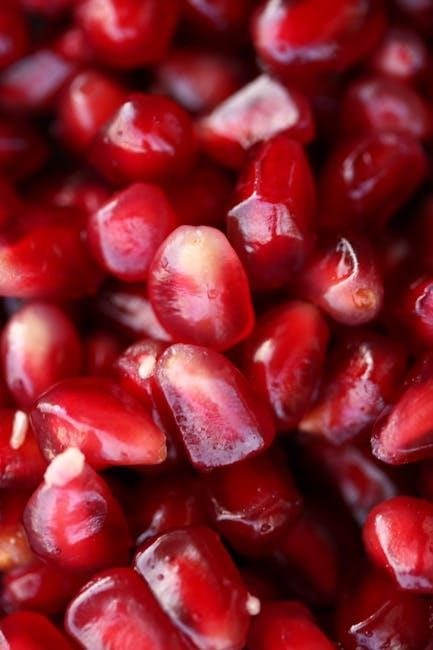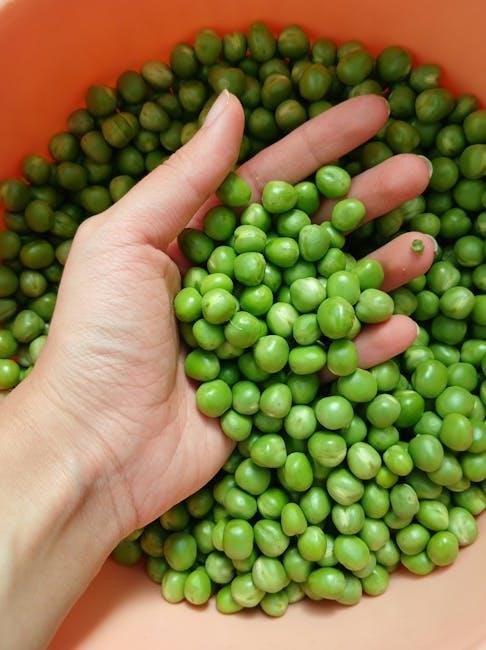A balanced diet plays a crucial role in managing gastric ulcers by avoiding irritants and incorporating soothing foods. This approach helps alleviate symptoms and supports healing, while also promoting overall digestive health.

What is a Gastric Ulcer?
A gastric ulcer, also known as a peptic ulcer, is a sore that develops on the lining of the stomach or the upper part of the small intestine. It occurs when the protective mucus layer of the stomach is damaged, allowing stomach acid to erode the tissue. Gastric ulcers can cause symptoms such as stomach pain, bloating, nausea, and sometimes vomiting. If left untreated, they can lead to serious complications like bleeding or perforation. Gastric ulcers are often associated with Helicobacter pylori infections, long-term use of nonsteroidal anti-inflammatory drugs (NSAIDs), or excessive acid production in the stomach. Early diagnosis and treatment are essential to prevent complications and promote healing. Understanding the nature of gastric ulcers is crucial for managing symptoms and implementing an appropriate treatment plan, which often includes dietary changes and medical interventions.

Dietary Approach for Gastric Ulcers
A gastric ulcer diet focuses on a balanced intake of foods that reduce stomach acid and irritation. It emphasizes avoiding irritants, incorporating soothing foods, and eating lean proteins and whole grains to promote healing.

Foods to Avoid
Managing a gastric ulcer requires careful consideration of diet to avoid foods that can exacerbate symptoms. Spicy foods, citrus fruits, and tomatoes should be avoided due to their acidic nature, which can irritate the stomach lining. Alcohol and caffeine are also triggers, as they can stimulate acid production and worsen discomfort. Processed and fatty foods, which are hard on the digestive system, should be limited. While dairy products may help some by neutralizing acid, others may find them irritating, making individual tolerance key. A bland diet focusing on easily digestible foods like bananas, rice, applesauce, and toast is often recommended. Lean meats are preferable to fatty ones, and cooking methods should avoid heavy spices. Portion control and eating smaller, frequent meals can aid digestion. Herbal teas and warm water are soothing alternatives to avoid beverages like alcohol and caffeine. Personalizing the diet based on individual reactions and consulting a healthcare provider can lead to an effective management plan.
Foods to Include
Incorporating the right foods into a gastric ulcer diet is essential for healing and symptom relief. Focus on bland, non-irritating options that promote a soothing effect on the stomach lining. Non-acidic fruits like bananas, apples, and melons are ideal, as they are gentle on the digestive system. Vegetables such as cooked carrots, green beans, and squash are also beneficial. Whole grains like oatmeal, rice, and toast provide fiber without causing irritation. Lean proteins, such as chicken, turkey, and fish, are excellent choices when prepared without spices or fats. Low-fat dairy products, including yogurt and milk, can help neutralize stomach acid. Herbs like ginger and aloe vera are known for their anti-inflammatory properties and can be incorporated in moderation. Hydration is key, so drinking plenty of water throughout the day is recommended. A balanced and mindful approach to nutrition can significantly aid in managing gastric ulcers and supporting overall recovery.

Foods That Can Cause Discomfort
Certain foods can irritate the stomach lining, worsening gastric ulcer symptoms. Acidic foods, spicy dishes, alcohol, caffeine, and fatty or fried foods are common culprits that may trigger discomfort and should be avoided.
Acidic Foods
Acidic foods can exacerbate gastric ulcer symptoms by irritating the stomach lining and increasing acid production. Foods with high acidity include citrus fruits like oranges, lemons, and grapefruits, as well as tomatoes and vinegar-based products. Consuming these can cause discomfort and prolong healing. To manage this, it’s advisable to avoid or limit these foods during active flare-ups. However, some acidic foods, like berries, contain antioxidants that may offer long-term benefits when consumed in moderation. Balancing the diet by avoiding overly acidic foods while incorporating mild, easily digestible options can help alleviate symptoms. It’s important to identify and avoid trigger foods that personally worsen discomfort, as sensitivity to acidity can vary among individuals. Monitoring the body’s response and adjusting the diet accordingly is key to managing gastric ulcers effectively.
Spicy Foods
Spicy foods can significantly irritate the stomach lining, worsening gastric ulcer symptoms. The capsaicin in chili peppers can cause discomfort, inflammation, and slow healing. Reducing or avoiding spicy dishes is crucial for managing ulcers effectively.
Individuals with gastric ulcers should opt for mild, non-irritating alternatives to minimize discomfort. While occasional small portions may be tolerated, consistent avoidance is recommended during active healing phases to prevent further irritation and promote recovery;
Alcohol Consumption
Alcohol consumption can exacerbate gastric ulcer symptoms by irritating the stomach lining and delaying healing. It can increase stomach acid production, which may worsen discomfort and prolong recovery. Even moderate alcohol intake can trigger pain and inflammation in some individuals.
While occasional, small amounts of alcohol may be tolerated, it is generally recommended to limit or avoid alcohol during the active healing phase of a gastric ulcer. Certain alcoholic beverages, such as spirits and beer, are more likely to cause irritation. If alcohol is consumed, it should be done in moderation and accompanied by food to reduce stomach acid exposure. Consulting a healthcare provider for personalized advice on alcohol consumption is essential, as they can offer guidance based on the severity of the condition and overall health.
Caffeine Intake
Caffeine can stimulate stomach acid production, potentially worsening gastric ulcer symptoms. Foods and beverages containing caffeine, such as coffee, tea, and certain soft drinks, may trigger discomfort and hinder the healing process.

While moderate caffeine intake may be tolerable for some, it is advisable to monitor its effects. If symptoms like heartburn or pain arise after consuming caffeinated products, it may be best to limit or avoid them during the recovery period. Opting for decaffeinated alternatives can help reduce acid stimulation and promote a soothing environment for the stomach lining.
Individual tolerance to caffeine varies, so personalized adjustments are key. Consulting with a healthcare provider can provide tailored recommendations to balance dietary choices and manage symptoms effectively.
Lifestyle Modifications
Adopting a healthy lifestyle is essential for managing gastric ulcers. This includes eating smaller, frequent meals, avoiding late-night snacks, and practicing stress-reducing activities. Proper hydration and avoiding irritants also support healing.
Eating Habits

Developing healthy eating habits is crucial for managing gastric ulcers. Eating smaller, frequent meals throughout the day can reduce stomach strain and prevent acid buildup. It’s important to chew food thoroughly and eat slowly to aid digestion. Avoiding late-night meals or snacks close to bedtime can also help prevent nighttime acid reflux. Additionally, staying upright after meals for at least 30 minutes can prevent stomach contents from flowing back into the esophagus. Incorporating these practices into your daily routine can significantly alleviate symptoms and support the healing process. By adopting mindful eating habits, individuals with gastric ulcers can better manage their condition and improve overall digestive health.
Stress Management
Stress management is a critical component of managing gastric ulcers, as stress can exacerbate symptoms and slow healing. Chronic stress can increase stomach acid production, worsening discomfort and delaying recovery. Engaging in stress-reducing activities such as meditation, yoga, or deep breathing exercises can help mitigate these effects. Additionally, setting realistic goals, maintaining a daily routine, and seeking support from family or friends can alleviate emotional strain. Time management and prioritization of tasks can also reduce stress levels, creating a more balanced lifestyle. By addressing stress holistically, individuals with gastric ulcers can create an environment conducive to healing and overall well-being. Incorporating stress management techniques into daily life not only improves digestive health but also enhances mental and physical resilience, making it easier to adhere to dietary and lifestyle recommendations for gastric ulcer recovery.
Hydration
Proper hydration is essential for maintaining digestive health and managing gastric ulcers. Drinking enough water helps prevent the concentration of stomach acid, which can worsen ulcer symptoms. Aim to drink at least 8-10 glasses of water daily, preferably between meals rather than during them, to avoid diluting digestive enzymes. Avoid carbonated beverages, as they can cause bloating and discomfort. Herbal teas, such as chamomile or peppermint, can also be soothing and aid digestion when consumed in moderation. It’s important to avoid excessive fluid intake during meals, as this can dilute stomach acid and impair digestion. Additionally, staying hydrated helps maintain the mucous lining of the stomach, which protects it from acid damage. By prioritizing hydration, individuals can support their digestive system and promote healing of gastric ulcers. This simple yet effective practice is a key component of a holistic approach to managing the condition.



About the author